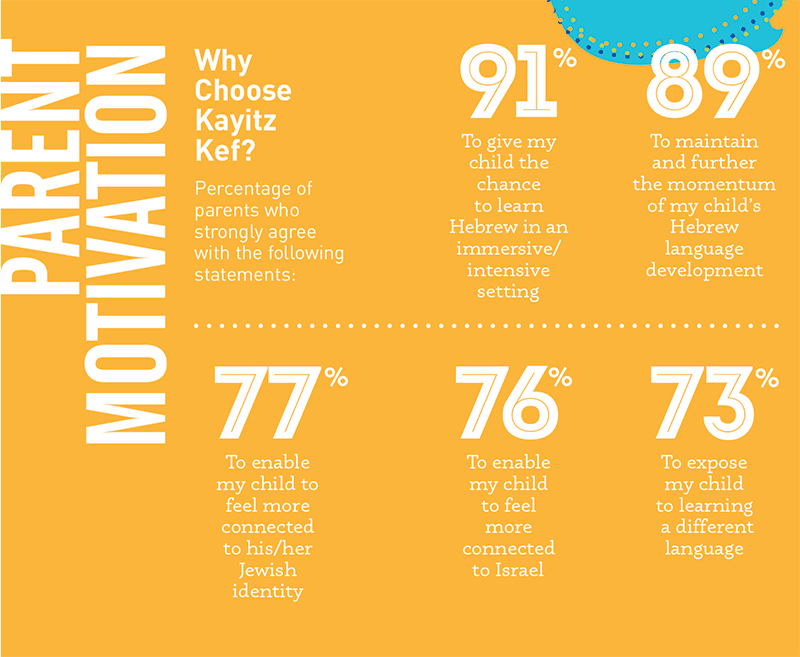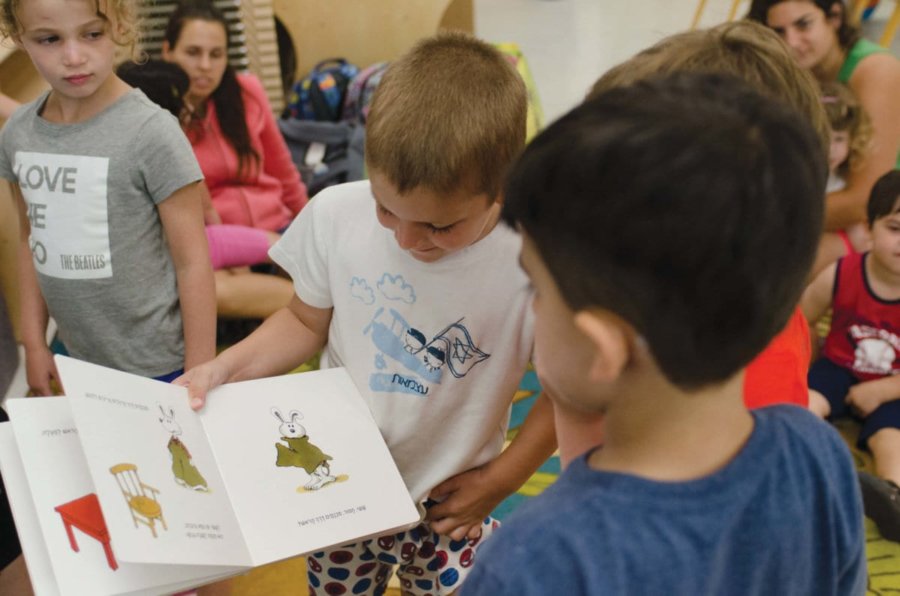Challenge
In 2012, The Areivim Philanthropic Group was determined to create and invest in a new initiative to advance one of its primary goals: developing and supporting transformational projects designed to impact the next generation of Jews. The Group was especially interested in making an impact on Hebrew-language learning in North America, and they recognized that the methodology for teaching Hebrew used in the charter schools they already supported could also be employed for Hebrew education in other settings. After conducting exploratory research, Areivim decided to develop partially-immersive programs at Jewish day camps where, for at least four weeks at a time, elementary school-age children would experience, learn, and enjoy modern spoken Hebrew in the fun day camp setting.
At that time, many still found the concept of a Hebrew proficiency-based day camp program to be outlandish. There was a general lack of investment in Hebrew in the day camp sector. Moreover, in the overnight sector, most camps related to Hebrew in a positive but largely symbolic fashion. Few children returned from camp having learned Hebrew such that they could communicate in any significant way. With the support of Rosov Consulting, The Areivim Philanthropic Group sought to change both the perception and the outcomes of Hebrew at camp through the program that became known as “Kayitz Kef,” meaning “Summer of Fun.”
Approach
At the beginning of our collaboration, Rosov Consulting supported The Areivim Philanthropic Group in exploring different possible endeavors to advance their overall goal for Hebrew language, including Hebrew in early childhood education and Hebrew for Birthright alumni, among others. The Hebrew at Camp model “won out” in part because the concept paper excited enough funders to invest in it. At the same time, Rosov Consulting conducted research to determine what it would take to develop an effective program; this research included visiting existing Hebrew and other language camps to see what was productive and what worked best. As a result, Rosov Consulting developed a plan for bringing a Hebrew immersion track to Jewish day camp programs for pre- and elementary-school-age children. Weighing whether to start this initiative in day or overnight camps, the decision was made to begin the design experiment in day camps.
While spending their summer at a Jewish day camp, young children’s ability to communicate in Hebrew would develop significantly as they experience, learn, and enjoy modern spoken Hebrew utilizing the Proficiency Approach to foreign language acquisition, a gold standard in language education endorsed by the American Council on the Teaching of Foreign Languages (ACTFL). Guided by young, charismatic Hebrew-speaking counselors including Israeli shlichim specifically trained in proficiency education, campers would also develop a positive connection to Israel – all while having the fun, positive experiences expected of a summer camp. The program was initially framed as a one-year experiment with the intent, if successful, of continuing for at least two more years with the support of Areivim members.
As the program began its first year at a single camp, Rosov Consulting transitioned from being program designers to program evaluators. Rosov Consulting’s closeness to the program from Day 1 meant that as evaluators we were sensitive to the radical nature of the initiative and offered a perspective beyond data analysis. As such, during the early years of Kayitz Kef, Rosov Consulting helped to determine the program’s effectiveness and opportunities for scaling.
Results

Since the launch of the first camp program in 2013, Areivim has engaged Rosov Consulting each year to evaluate implementation and outcomes. Proof of concept was established during the first three years as the program grew incrementally—from one camp, to three, to five. In Year 3, the Foundation for Jewish Camp began to serve as the national platform for Kayitz Kef – a role it continued to play through the end of Year 5, when Areivim brought operations in-house and hired its first full-time staff. This included a National Director to spearhead the program and a Director of Hebrew Programming to oversee the pedagogy and training. Having just completed its sixth summer with programs at 13 day camps across North America, the results are promising. Here are some of the outcomes we’ve discovered:
- Language Gains Among Children: The immersion program, based on the Proficiency Approach, successfully enables campers to maximize their language acquisition experience.
- Deep Connection to Israel and Israelis: Campers interact with charismatic Israeli role models in an authentic and engaging way, creating a strong emotional connection that is not achieved to the same degree when Israeli counselors are speaking to children primarily in English.
- Transformed Perceptions of Hebrew Among Parents: Parents learn that it is possible for their children to have fun while learning Hebrew, dispelling school-related connotations. Some parents even become inspired to learn Hebrew themselves.
- Spillover Effect: The ongoing presence of campers and counselors speaking Hebrew intensifies an Israeli cultural presence and engagement with Hebrew for adults and campers throughout the entire camp.
- Summer to Summer Language Gains: Returning campers show that they recoup their language gains from the previous summer within less than three weeks, providing them with at least four-to-five weeks to build ever higher levels of proficiency.
- Jewish Content Area for JCCs: For Kayitz Kef programs taking place at JCCs, camps welcome contemporary Hebrew culture and Israeli educators as a means to build a sense of Jewish Peoplehood beyond religious belief or practice.
